On the morning of Oct. 18 in Beijing, in a darkened restaurant that had been ordered closed by the authorities, a memorial service was held for Ms. Lin Xiling, the woman popularly known as the “last rightist in China.” Lin had died on Sept. 21 in Paris, ending her 74 years of an extraordinary life.
“Rightist” in China refers to a group of over half a million Chinese students and scholars who had criticized the Chinese Communist Party (CCP) in 1957. They had initially been encouraged to speak out by the CCP’s leader, Mao Zedong, who had famously published the slogan “Letting a hundred flowers bloom and a hundred schools of thought contend.”
The invitation to freedom of expression was a trap that China’s scholars fell into. Mao later admitted that he wanted to expose those who were against the communist rule of China; or as he poetically expressed his idea, “to bring the snakes out of their holes.”
These people were labeled as “rightists” and sent to labor camps, tortured, starved, and killed. Among them, there were 22,115 who “committed suicide” and over 3,500 listed as “missing,” according to the CCP’s own report in 1958.
Lin was one of the five so-called “giant rightists,” as determined by Mao. Lin was then only 22 years old, a senior law student at the People’s University of China (known today as Renmin University of China). She was put into jail for 15 years as an “anti-revolutionary element.”
In 1979, after Mao’s death, the CCP decided the “rightists” had been either successfully rehabilitated through labor and thought transformation or had been the victims of a “necessary but overly generalized Anti-Rightist Movement.” Many of the convictions were revoked, with the exception of roughly 3,000 people nationwide.
Deng Xiaoping, the paramount leader of China after Mao’s death, who led the Anti-Rightist Movement, decided that Lin and the other four giant rightists should not have their names cleared because they were truly attacking the CCP and refused to transform their thinking.
“Rightist” in China refers to a group of over half a million Chinese students and scholars who had criticized the Chinese Communist Party (CCP) in 1957. They had initially been encouraged to speak out by the CCP’s leader, Mao Zedong, who had famously published the slogan “Letting a hundred flowers bloom and a hundred schools of thought contend.”
The invitation to freedom of expression was a trap that China’s scholars fell into. Mao later admitted that he wanted to expose those who were against the communist rule of China; or as he poetically expressed his idea, “to bring the snakes out of their holes.”
These people were labeled as “rightists” and sent to labor camps, tortured, starved, and killed. Among them, there were 22,115 who “committed suicide” and over 3,500 listed as “missing,” according to the CCP’s own report in 1958.
Lin was one of the five so-called “giant rightists,” as determined by Mao. Lin was then only 22 years old, a senior law student at the People’s University of China (known today as Renmin University of China). She was put into jail for 15 years as an “anti-revolutionary element.”
In 1979, after Mao’s death, the CCP decided the “rightists” had been either successfully rehabilitated through labor and thought transformation or had been the victims of a “necessary but overly generalized Anti-Rightist Movement.” Many of the convictions were revoked, with the exception of roughly 3,000 people nationwide.
Deng Xiaoping, the paramount leader of China after Mao’s death, who led the Anti-Rightist Movement, decided that Lin and the other four giant rightists should not have their names cleared because they were truly attacking the CCP and refused to transform their thinking.
Lin in fact tried numerous times for the sake of her children to shed her rightist hat, but was unsuccessful. But she never thought she had done anything wrong. In the last years of her life she felt honored to be a rightist and said that the CCP, which had committed crimes against the people, had no right to “rehabilitate” her.
Lin eventually left China and became a French citizen, but she missed her home and her country. Five days prior to her death, when she received a call from her old friend, Tie Liu, in Beijing, she cried on the phone, “I want to return to China. … I would rather die in my hometown,” Tie Liu recalled.
Tie Liu’s real name is Zerong Huang. He was a young journalist working for the Chengdu Daily when he was labeled a rightist. After 23 years of life that he says were “in hell,” he was declared rehabilitated.
He went to Beijing and started a private business. After his retirement, he began to write memoirs of what he had experienced and witnessed during the Anti-Rightist Movement. He resented the fact that the CCP had never apologized to the rightists and had never compensated them for their loss of 20 years of life and salary.
He wrote an open letter to Hu Jintao, the current leader of the CCP, with over 1,000 signatures, demanding an apology and compensation. He resented the fact that no meeting is allowed in China to memorialize the victims of the Anti-Rightist Movement and to reflect on the mistakes the CCP has made.
Tie Liu met Lin Xiling for the first time in a conference in memory of the 50-year anniversary of the Anti-Rightist Movement held at Princeton University in 2007. He refused to forget the tragedy and encouraged people to overcome their fears and write down their memories. His printed collection of these writings is called “Traces of the Past.”
He is angry that the CCP today still blocks his mailing the collection to friends—or to anyone—has confiscated his printing press from a print shop, and claimed he did not have a printing permit, making his book illegal.
His writings, though, have found their way to overseas Web sites (for instance, www.observechina.net). In his most recent article he protests, “For 60 years, we have had no freedom of speech or communication.”
He could not change the authorities’ mind about letting Lin come home, but he thought at least he could organize a memorial service in Beijing for her. He did not think such a service could be done openly—it had to be done in the name of a group luncheon.
In order to escape the close monitoring of the secret police, Tie Liu and his friends abandoned phones and e-mails and only notified people in person. He made lunch reservations for 80 people in a restaurant in Beijing on Oct. 18, the customary 28 days after Lin’s death, and put down a 1,000 yuan (US$146.50) deposit.
Four days before the service, he realized the Beijing authorities had found out. Many attendees were warned not to attend the service, and the restaurant was ordered to close for “maintenance.” On Oct. 16, the Office of Social Stability notified Tie Liu that he must cancel the service and told him he would be watched and kept home anyway. The office also threatened that his application to leave China to visit his children in the United States would be even harder to get approved if he did not cooperate.
Tie Liu, like Lin, 74 years old, was furious. He wrote in an article about the memorial service, “Lin is a rightist, and I am a rightist. We have suffered our whole lives simply because of one speech we made or one article we wrote 50 years ago. We have gotten no apology and no compensation. Mao caused the death and the sufferings of over 550,000 Chinese intellectuals. Lin died in a foreign country and was not allowed to return to her hometown by the current regime. We, friends of Lin, in our 70 or 80s, just want to express our feelings for her in tears. Is that too much to ask?”
Tie Liu left home the night before the service and checked into a hotel. He called his friends using the hotel phone and confirmed that the service would go ahead as scheduled and everyone should try his best to attend. “Jail or death shall not stop us,” he stressed.
At 7:45 a.m. on Oct. 18, carrying Lin’s portrait, a banner, and 15 posters, Tie Liu arrived at the restaurant and was met by two fellow rightists from Sichuan and Hunan provinces and many plain-clothes police officers. The door of the restaurant was closed with a notice posted “for maintenance.”
Tie Liu found the owner of the restaurant and convinced him he had to wait for the arrival of all his friends before they could go to find another place for the meeting. When over 100 people, including the plain-clothes police, got into the restaurant, Tie Liu and his friends quickly closed the door, moved to a large dark room, opened the window curtain, hung the portrait and banner, and put out a small white paper flower. They were ready for the service.
“We want to welcome you officers from public and national security,” Tie Liu announced. “You are welcome to watch us for anything we do against law or the government.”
“Feeling embarrassed and awkward, those guys left,” Tie Liu recalled in his article.
At 9 a.m., the service started first with a moment of silence for the memory of Lin Xiling, and then a second moment of silence for the 550,000 Chinese intellectuals who had suffered as rightists, particularly for those who died as a result of torture, labor, and starvation. Over 15 people spoke. Many of the attendees were younger people.
Around 11 a.m., after the restaurant owner, who was in fear of losing his license, repeatedly begged Tie Liu, they agreed to remove the portrait and banner. The service continued until 2 o’clock in the afternoon.
They were very happy they had succeeded and considered the service they held for Lin in a dark room a victory of defending their rights.
When Tie Liu got home around 4 p.m., two public security officers were waiting for him in his living room. They asked him how the service went and appeared to be surprised by the number of attendees.
Tie Liu took the opportunity to calmly tell them the history of the Anti-Rightist Movement and the life and sufferings of Lin Xiling. He told them he was appalled by the banner “Long Live Mao Zedong’s Thoughts” in the recent parade celebrating the sixtieth anniversary of the CCP’s rule over China.
“The core elements of Mao’s thoughts are class struggle, violent revolution, and proletarian dictatorship. ... One day you could be the victim, too,” he told the two officers.
Lin eventually left China and became a French citizen, but she missed her home and her country. Five days prior to her death, when she received a call from her old friend, Tie Liu, in Beijing, she cried on the phone, “I want to return to China. … I would rather die in my hometown,” Tie Liu recalled.
Tie Liu’s real name is Zerong Huang. He was a young journalist working for the Chengdu Daily when he was labeled a rightist. After 23 years of life that he says were “in hell,” he was declared rehabilitated.
He went to Beijing and started a private business. After his retirement, he began to write memoirs of what he had experienced and witnessed during the Anti-Rightist Movement. He resented the fact that the CCP had never apologized to the rightists and had never compensated them for their loss of 20 years of life and salary.
He wrote an open letter to Hu Jintao, the current leader of the CCP, with over 1,000 signatures, demanding an apology and compensation. He resented the fact that no meeting is allowed in China to memorialize the victims of the Anti-Rightist Movement and to reflect on the mistakes the CCP has made.
Tie Liu met Lin Xiling for the first time in a conference in memory of the 50-year anniversary of the Anti-Rightist Movement held at Princeton University in 2007. He refused to forget the tragedy and encouraged people to overcome their fears and write down their memories. His printed collection of these writings is called “Traces of the Past.”
He is angry that the CCP today still blocks his mailing the collection to friends—or to anyone—has confiscated his printing press from a print shop, and claimed he did not have a printing permit, making his book illegal.
His writings, though, have found their way to overseas Web sites (for instance, www.observechina.net). In his most recent article he protests, “For 60 years, we have had no freedom of speech or communication.”
He could not change the authorities’ mind about letting Lin come home, but he thought at least he could organize a memorial service in Beijing for her. He did not think such a service could be done openly—it had to be done in the name of a group luncheon.
In order to escape the close monitoring of the secret police, Tie Liu and his friends abandoned phones and e-mails and only notified people in person. He made lunch reservations for 80 people in a restaurant in Beijing on Oct. 18, the customary 28 days after Lin’s death, and put down a 1,000 yuan (US$146.50) deposit.
Four days before the service, he realized the Beijing authorities had found out. Many attendees were warned not to attend the service, and the restaurant was ordered to close for “maintenance.” On Oct. 16, the Office of Social Stability notified Tie Liu that he must cancel the service and told him he would be watched and kept home anyway. The office also threatened that his application to leave China to visit his children in the United States would be even harder to get approved if he did not cooperate.
Tie Liu, like Lin, 74 years old, was furious. He wrote in an article about the memorial service, “Lin is a rightist, and I am a rightist. We have suffered our whole lives simply because of one speech we made or one article we wrote 50 years ago. We have gotten no apology and no compensation. Mao caused the death and the sufferings of over 550,000 Chinese intellectuals. Lin died in a foreign country and was not allowed to return to her hometown by the current regime. We, friends of Lin, in our 70 or 80s, just want to express our feelings for her in tears. Is that too much to ask?”
Tie Liu left home the night before the service and checked into a hotel. He called his friends using the hotel phone and confirmed that the service would go ahead as scheduled and everyone should try his best to attend. “Jail or death shall not stop us,” he stressed.
At 7:45 a.m. on Oct. 18, carrying Lin’s portrait, a banner, and 15 posters, Tie Liu arrived at the restaurant and was met by two fellow rightists from Sichuan and Hunan provinces and many plain-clothes police officers. The door of the restaurant was closed with a notice posted “for maintenance.”
Tie Liu found the owner of the restaurant and convinced him he had to wait for the arrival of all his friends before they could go to find another place for the meeting. When over 100 people, including the plain-clothes police, got into the restaurant, Tie Liu and his friends quickly closed the door, moved to a large dark room, opened the window curtain, hung the portrait and banner, and put out a small white paper flower. They were ready for the service.
“We want to welcome you officers from public and national security,” Tie Liu announced. “You are welcome to watch us for anything we do against law or the government.”
“Feeling embarrassed and awkward, those guys left,” Tie Liu recalled in his article.
At 9 a.m., the service started first with a moment of silence for the memory of Lin Xiling, and then a second moment of silence for the 550,000 Chinese intellectuals who had suffered as rightists, particularly for those who died as a result of torture, labor, and starvation. Over 15 people spoke. Many of the attendees were younger people.
Around 11 a.m., after the restaurant owner, who was in fear of losing his license, repeatedly begged Tie Liu, they agreed to remove the portrait and banner. The service continued until 2 o’clock in the afternoon.
They were very happy they had succeeded and considered the service they held for Lin in a dark room a victory of defending their rights.
When Tie Liu got home around 4 p.m., two public security officers were waiting for him in his living room. They asked him how the service went and appeared to be surprised by the number of attendees.
Tie Liu took the opportunity to calmly tell them the history of the Anti-Rightist Movement and the life and sufferings of Lin Xiling. He told them he was appalled by the banner “Long Live Mao Zedong’s Thoughts” in the recent parade celebrating the sixtieth anniversary of the CCP’s rule over China.
“The core elements of Mao’s thoughts are class struggle, violent revolution, and proletarian dictatorship. ... One day you could be the victim, too,” he told the two officers.
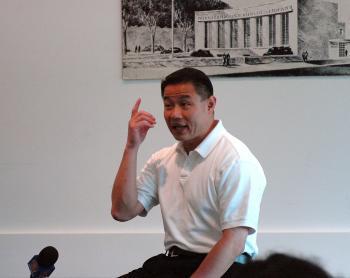
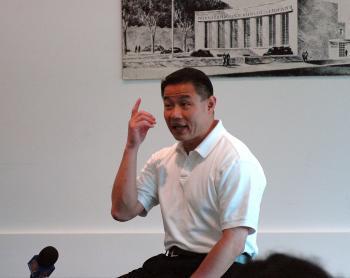
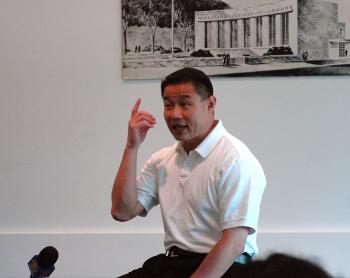
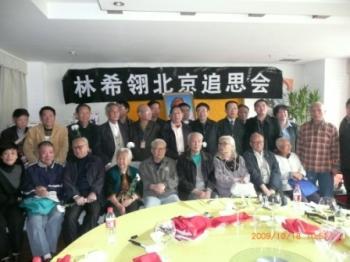
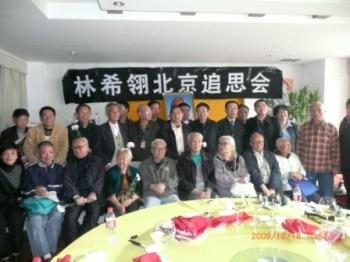
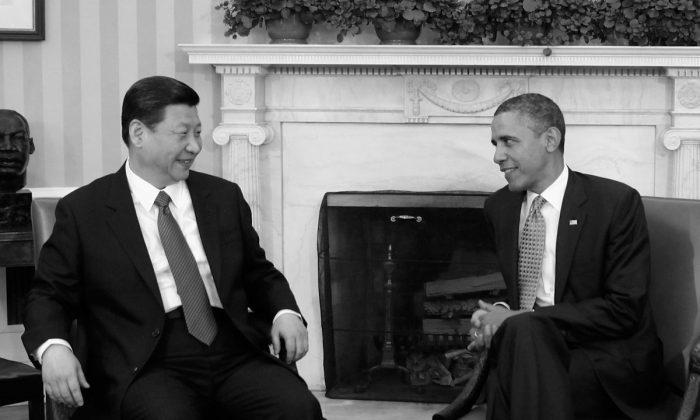
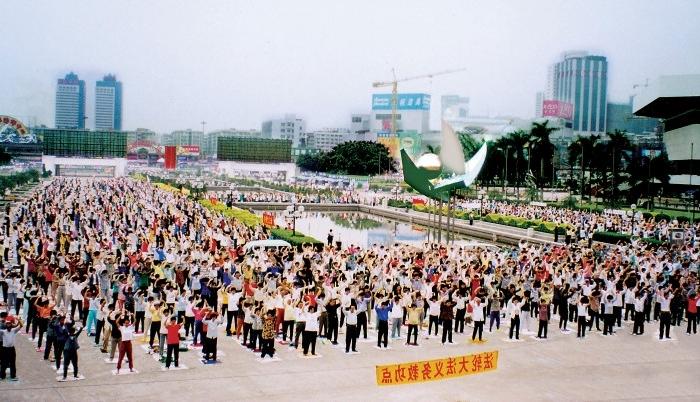
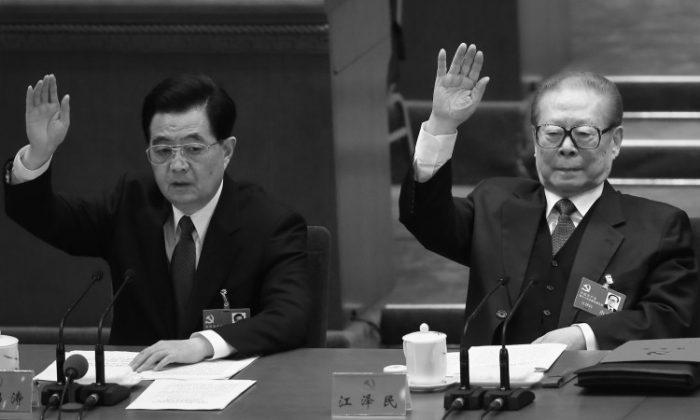
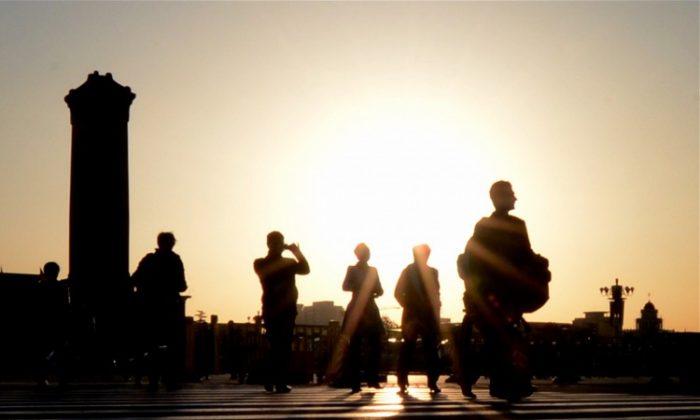
Friends Read Free